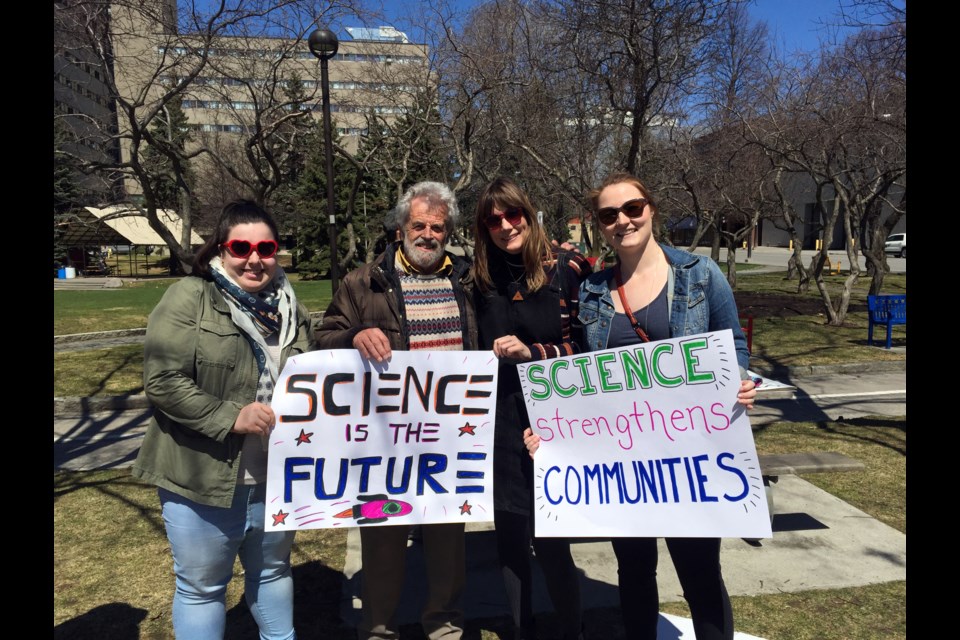By Dr. David Pearson, Laurentian University
I was pleased to be part of the March for Science in Sudbury last Saturday. I was proud of the students who organized the event and led us along Paris Street to Memorial Park, and impressed by the variety of good reasons that drew about 80 people to participate.
Nigel Smith, director of SNOLAB, was marching in support of collaborative science and evidence-based decision making internationally. We chatted about the research program at SNOLAB, the deep ultra-clean underground research facility at Creighton Mine that has helped keep Canadian physics in the world's spotlight, and how the projects are all strongly international in nature.
Nigel noted the highly sophisticated research experiments being planned with physicists around the world need a high level of collaboration, and like many science programs, a strong international commitment to fundamental research, the bedrock of scientific progress.
One of our fellow marchers spoke of budgets for health research in Canada not being sufficient.
The value of health research was poignantly made by a brave woman who marched with a walker and told us all, when she spoke in Memorial Park, that she owed her life to the insulin developed by Drs. Banting and Best. I wondered if she realised she had walked past the home of Dr. Best’s son, Henry, when he was president of Laurentian University.
Another Sudbury connection, perhaps the strongest under the circumstances in Washington right now, came to mind as we passed Lake Ramsey on our right and could see the stack of the Copper Cliff smelter on the horizon to our left.
It was a reminder that revisions to the Clean Air Act in the United States, severely limiting acidic sulphur dioxide emissions almost 30 years ago, were heavily influenced by evidence from research on Sudbury’s acidified lakes.
Careful science done by people like Bill Keller in the Ministry of the Environment, still working in Laurentian’s Lake Centre today, showed how effectively Sudbury’s lakes began to recover from acidic pollution after severe reductions in INCO’s emissions were legislated in the 1970s.
The result, in the words of an Environmental Protection Agency official quoted by Bill Chameides, the former Dean of the School of the Environment at Duke University in North Carolina, was “stunning reductions in the amount of acidity measured in rainfall and deposited in lakes and streams” in the eastern US.
Ironically and significantly, objections from industry south of the border to the acid rain regulations were strikingly similar to those of the coal industry in the US today: It would cost billions of dollars and would be a job killer. Looking back at the actual numbers, Bill Chameides was able to say in 2012 that the “U.S. acid rain regulations have worked.
“What’s more, they didn’t seem to get in the way of the country’s longest economic expansion.”
The costs were much lower than projected and almost 21 million jobs were added during the economic expansion. Furthermore, the health care benefits from improved air quality have been “estimated to be in the range of hundreds of billions of dollars annually.”
Of the motivations that brought us all to the March for Science, the most widely shared was the flat-out rejection of the science of climate change by the Trump administration.
Instead of attacking the Clean Air Act because of its limits on today’s greatest air pollutant, the greenhouse gas, carbon dioxide, Donald Trump and his supporters would do well to read the acid rain story.
Sudburians will be pleased to remind him of the value of science and the long-term benefits that come from decisions based on well-researched evidence.
Dr. David Pearson is a professor in the School of the Environment and the Laurentian University – Science North Science Communication program at Laurentian University.
